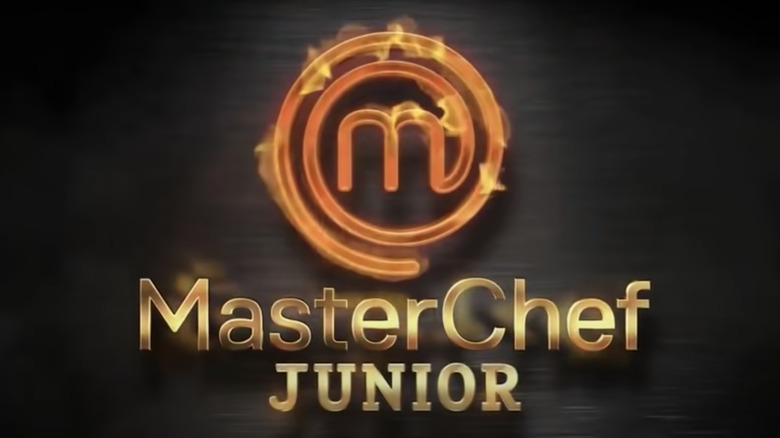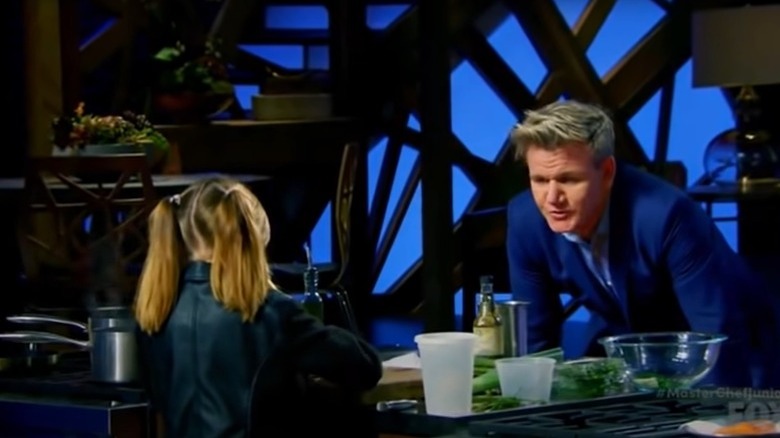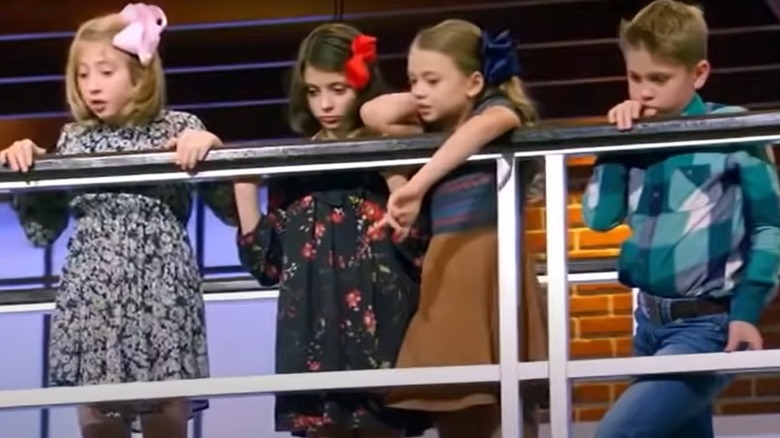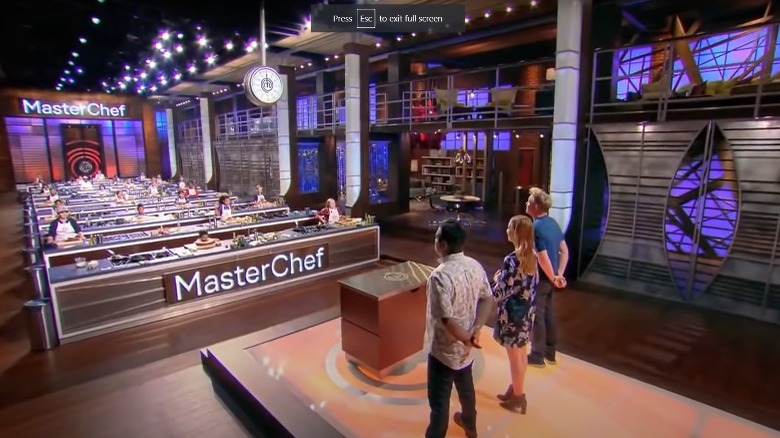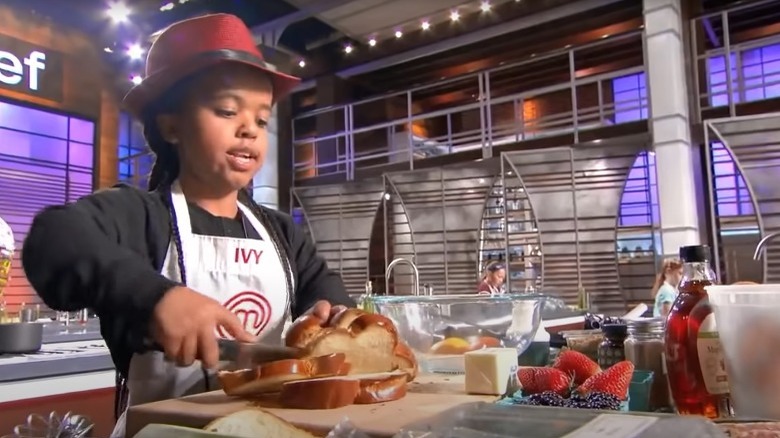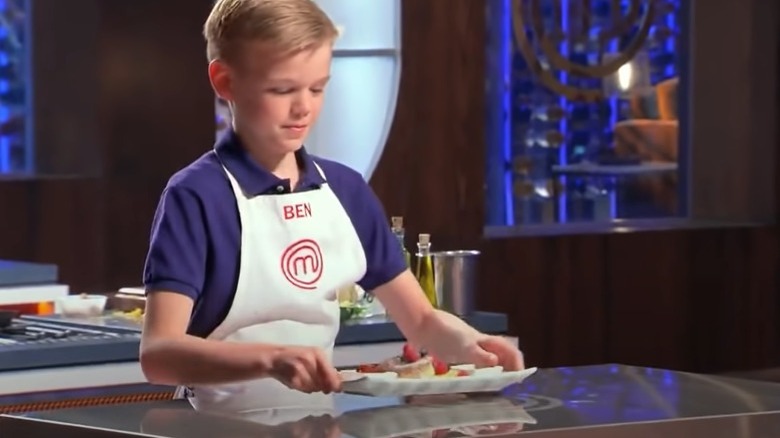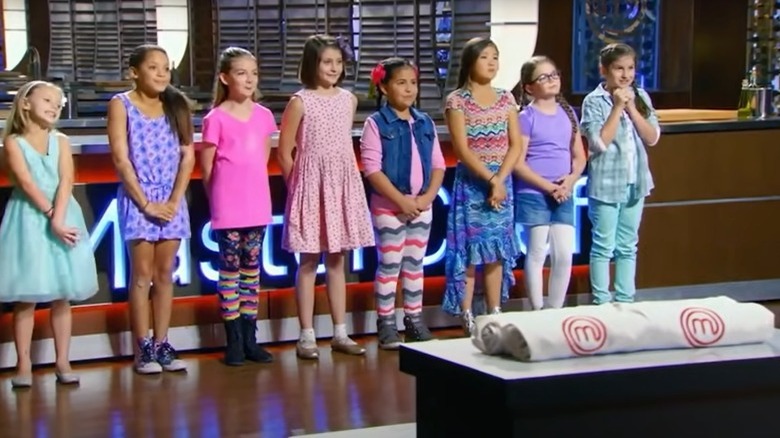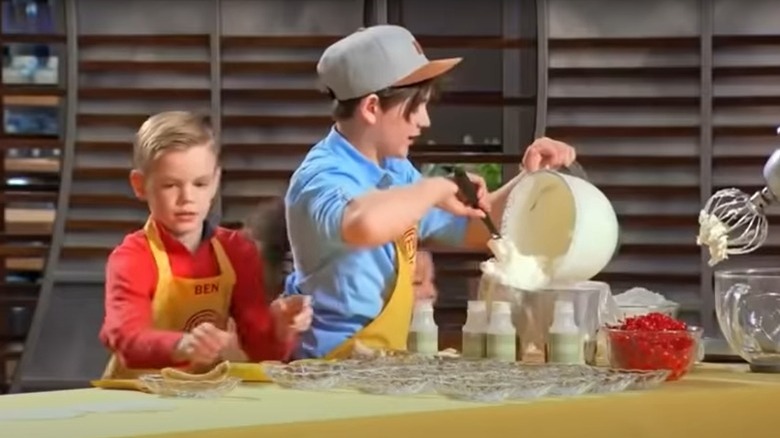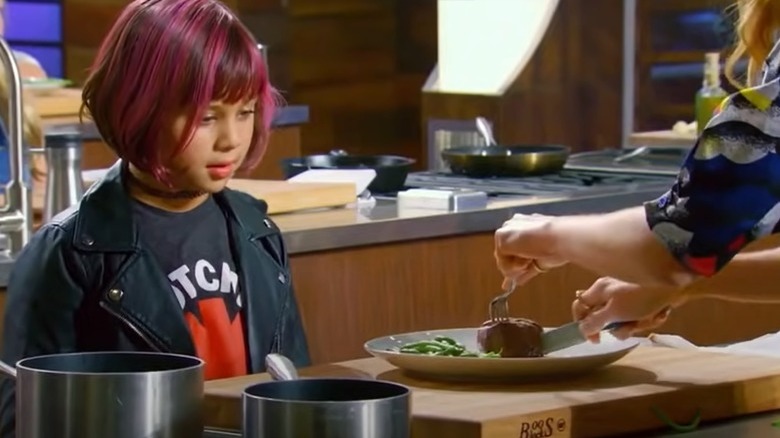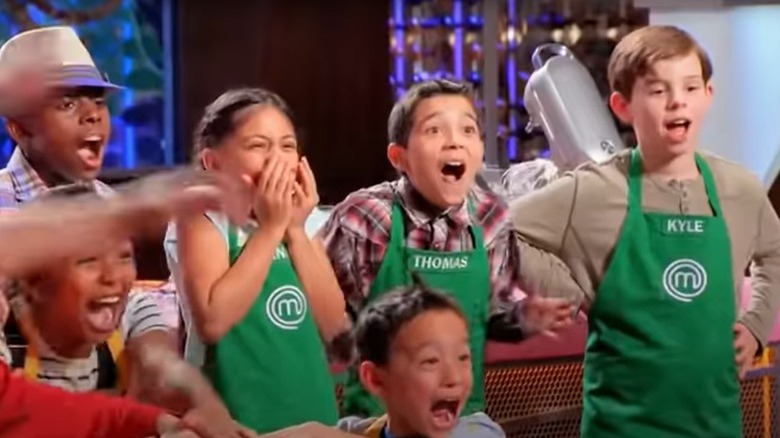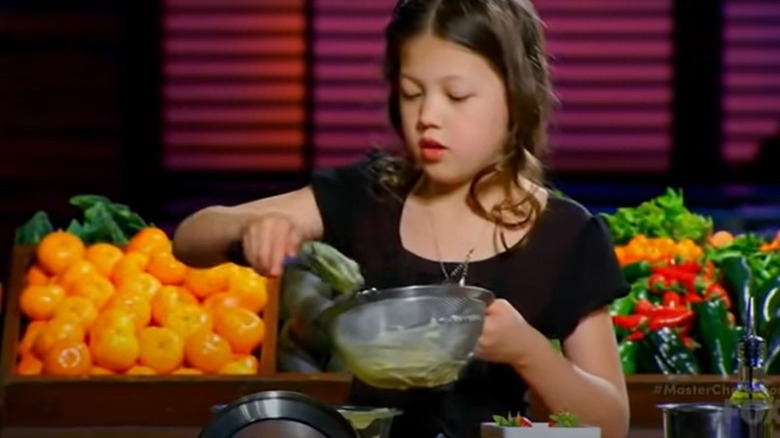What The Cameras Don't Show You On MasterChef Junior
Seeing young chefs (between 8 and 13 years) sear ahi tuna and make chicken liver pâté on "MasterChef Junior" can make you feel some hot shame about that average-looking omelet on your plate. But there is no reason to compare yourself to these kids; they are in a league of their own. Their knife skills are on point, they can make a soufflé rise like a cloud, and they're comfortable with spitting out words like fricassée. "MasterChef Junior" was launched in 2013, three years after "MasterChef" — the one with grown-ups (via Bustle). It has continued for eight seasons. Both shows take place on the same sets and have the same host: Gordon Ramsay, who seems to be a vastly different person in each show. While with adults, he minces no words, with kids, he is soft as a marshmallow and allows his face to be on a piñata.
The kids, according to pastry chef Christina Tosi, who was a judge on the show, "aren't ashamed to say they don't know the rules of cooking" (via Los Angeles Times). And they are constantly learning new things — like how to chop an onion without tearing up — even when the cameras are off. We know they have fun cracking eggs on Graham Elliot's head and getting showered with a ton of sugar, but what is their life like otherwise? Here's what the cameras don't show you on "MasterChef Junior".
The contestants balance schoolwork and show work
For "MasterChef Junior" contestants, life is more than about making that perfect cupcake. The mini-celebrities, believe it or not, have to continue their normal school lessons. Yep, arithmetic, science, and all that jazz. The only difference is that they classes on the same sets where they shoot the show four hours a day. The classrooms are right next to the kitchen, but the viewers don't get to see that, Robin Ashbrook, the executive producer of "MasterChef Junior", told HuffPost in 2013.
The filming for the show takes place for about nine weeks, during which the contestants have to re-locate with their parents or guardians to Los Angeles (via MasterChef Junior Casting). While they may not get to chit-chat with their school buddies during recess, they do get a private tutor who makes sure their television stardom doesn't affect their grades (via TV Plus). Are you surprised that they are required to get the lamb chops right while also acing their homework? So were some contestants when they realized that there is no escaping academics no matter how many Instagram followers you earn. Season 2 contestant Levi Eirinberg told Gapers Block that he was surprised to learn he will have to attend three hours of school a day. "And you actually have to be in a classroom setting. To me that surprised me more than the makeup," he said.
The parents can always see what their kids are up to
Did you shuffle anxiously in your chair every time a contestant botched a dish? Imagine the plight of the parents watching their kids face the heat. Though we only see a glimpse of them cheering for their cubs in the finale, as executive producer Robin Ashbrook told HuffPost, "They were at all times able to see what was going on in the kitchen." But thankfully, it wasn't a "'Dance Moms' atmosphere," he added. While "Dance Moms" had mothers of young dancers turning into rivals as the competition tightened, the "MasterChef Junior" guardians "really bonded" with each other, Ashbrook said, "All of the parents actually sat together and watched what happened."
Aviva Sisitsky, the mother of Season 7 contestant Kyle, told Suburbs 101, "Being thrown in that environment, you really get to know each other. I guess it's a little bit what you see in the military — we were in the trenches together, we cried together for our kids, we laughed, and we supported each other." To have their kids realize their dreams, the parents also had to make some sacrifices. Sisitsky had to hit pause on all her responsibilities (including her other two other kids) back on the East Coast and move to Los Angeles temporarily with Kyle. The same goes for Lenny Feygin, who accompanied his daughter Ariana Feygin, from Minnesota for Season 6 shoot.
There are medics present at all times
For those who have only seen kids around a play kitchen, "MasterChef Junior" may require some getting used to. Seeing their small hands wrap around a monstrous knife can seem a little unsettling. Gordon Ramsay doesn't do much to reassure you, saying, "they're not plastic knives; they're the best Japanese knives in the world. The equipment is second-to-none, whether it's a sous vide machine, or the best stove or hand blender. It's the real deal" (via Deadline).
But here's a surprising fact: grown chefs in "MasterChef" tend to have more kitchen accidents than the kiddos of "MasterChef Junior," as culinary producer Sandee Birdsong told Salon. Having said that, when filming the kids, there are extra precautions put in place and a larger team of medics on the sets, Adeline Ramage Rooney, executive producer, told TV Page (via Radar Online). In fact, there is a medic standing right at the end of every kitchen station, Robin Ashbrook, executive producer of "MasterChef Junior," confirmed to HuffPost.
And they have been quick to act during accidents like when contestant Kayla Mitchell accidentally cut two of her fingers with an eight-inch knife or when contestant Zac Kara burned his hand while doing the prep work for his dish. He had to finish cooking his pan-seared filet mignon and boiled lobster tail with just one hand (via Eater). The kids were fine. The viewers? We're not so sure.
The kids are trained to use the kitchen tools
No matter what level of culinary expertise each contestant has, they all have to sit through the safety training given by culinary producer and former "Top Chef" contestant Sandee Birdsong (via Buzzfeed). In a classroom that emulates the kitchen station shown on television, the kids are taught how to work the appliances like the oven and food processor by Birdsong and her team of 26 trainers. They are also given tips on how to make, say, a sauce or a pie crust in the most efficient way. "We teach a very basic application that works in our environment and that's what they tend to stay with, and it's their choice if they go off that mark [during a challenge]," she told Buzzfeed.
In 2011, a father of a "Junior MasterChef" Australia contestant — which, like "MasterChef Junior," is a spin-off of the original British show "MasterChef" — claimed that the kids knew about the challenges beforehand and only acted surprised for television (via Herald Sun). But per Birdsong's 2013 interview with Buzzfeed and a 2016 report in Entertainment, kids aren't told anything about the challenges.
The auditions are intense
From the number of kids who show up for "MasterChef Junior" open calls (every parent has to register their kid by filling out a form on Masterchef Junior Casting), it looks like a sizeable number of kids prefer a ladle to a joystick. Per Season 6 contestant Ariana Feygin's dad, there were as many as 10,000 kids in the open call he took his daughter to. Feygin had to audition three times before landing a spot among the 40 kids who were selected for the show. Recalling her first audition in Arizona, Minnesota-based Feygin told Lake Minnetonka Magazine, "I got very stressed out ... A lot of the kids had agents, but we discovered the casting crew didn't want that ... Just kids with big personalities."
And how does the judging panel get to see their big personalities? It's a long process. Ryan Kate Brandenburg who starred in "MasterChef Junior" Season 3, told Coppell Student Media that she had to show how well she could "cook an egg, cut celery and measure water". Brandenburg was tested on her knowledge of kitchen tools and appliances, following which she had to whip up a dish while on camera. Once she passed the screen test, she had to submit a video clip that captured her personal life — her home and family. There was also a "mountain of paperwork" too, she added.
All contestants stay in the same hotel
During the 9-week filming for the show, the contestants shared more than just the "MasterChef Junior" kitchen. They were all put up in the same hotel. As Sarah Lane, a Season 1 contestant, told HuffPost, "What people don't know about the show is the amount of downtime that the kids get. We'd go home around 4 or 5 p.m. every day and then just hang out at the hotel until the next morning." Sometimes, they hung out at the outdoor mall close to the hotel or grabbed a bite from one of the surrounding restaurants.
Recounting the days shooting for Season 7 of the show, Aviva Sisitsky, the mother of contestant Kyle Sisitsky, told Suburbs 101, "Since everybody stayed in the same hotel, the kids swam in the pool and had a chance to bond. Sundays were dark days. We all hung out together on those days and went on excursions to Malibu, Santa Monica pier, an aquarium." The other six days of the week were choc-a-bloc with filming and school work. "A bus took us back and forth from the set every day. Some days started really early and some ended late at night," added Sisitsky. Season 6 contestant Ariana Feygin told Lake Minnetonka Magazine that one day the bus picked them up as early as 4:30 a.m.
The bond between the contestants goes beyond the show
Besides turning the child contestants into pint-sized celebrities, "MasterChef Junior" helped foster relationships among them, which for some, like Season 1 finalist Dara Yu, went beyond friendship. "I would call it family! I have 12 new moms and 12 new sisters and brothers. They're just amazing and I talk to them almost every day!" she told Reality Wanted. For Season 6 contestant Camson Alevy, meeting the other kids in the show was the highlight of his "Masterchef Junior" experience. "We made so many good friendships," he said. As it turns out, the kiddos have a "mass group text" — "we talk about the show and what we've been cooking lately," Levi Eirinberg, a Season 2 contestant, told Gapers Block.
"The kids also still keep in close touch and support each other from afar," affirms Season 7 contestant Kyle Sisitsky's mom Aviva Sisitsky. So strong were the friendships that the Sisitskys, who live on the East Coast, didn't hesitate to fly out to Seattle to attend a fellow contestant's Bat Mitzvah. She told Suburbs 101, "There is a special bond that they share with each other, no matter how much time goes by."
The publicity from the series caused issues for some contestants
Life after "MasterChef Junior" was not the same for many contestants. For example, Logan Guleff, Season 2 winner, got the chance to visit President Obama and Michelle Obama at the White House (via MasterClassLady) and Season 1 contestant Dara Yu rode on the show's popularity to land opportunities in top restaurants (via HuffPost). "MasterChef Junior," which gets millions of viewers (The Season 7 finale had 4 million glued to their television, according to Talent Recap), turns kids into recognizable public figures. In Season 7 contestant Kyle Sisitsky's case, "A group of kids at the movie theater recognized him and approached him for pictures, sometimes at Chipotle he'll be randomly recognized," his mom, Aviva Sisitsky told Suburbs 101.
There is, however, some downside to all that spotlight. As Sisitsky explained, "We had a few issues with our kid's public Instagram accounts. There were some overzealous fans wanting to meet our children. We had to block and report what was happening, even to law enforcement in a few cases." Season 1 contestant Troy Glass also had to deactivate his Twitter account, though for a different reason. Glass, who was just 12 when the show was filmed, had said something negative about a fellow contestant Sarah Lane. "They [The film crew] left that in. I don't think it was their intention, but Troy ended up getting a lot of hate because of that comment," recalled Lane to HuffPost.
The contestants are given more breaks than what's shown
Even as a viewer, the last few nerve-wracking seconds of a challenge can have you reaching for a glass of water. And by the time you take a gulp, the first contestant is called to the judge's table. Gosh, where is the time to breathe? You can rest easy knowing that the kids and the judges do take a time-out after each challenge — sometimes, as reported on Entertainment, they even step away for lunch. Per a Buzzfeed report which gives details about the show's filming on the sets of Paramount Lot in Los Angeles, as soon as a certain egg-making challenge was announced, the judges took a break and the camera crew asked the kids to assemble back for a second take of them rushing to their cooking stations.
However, what doesn't get a second take is the actual challenge itself. According to Entertainment, the contestants cook without a break for a whole hour, as is shown on television. "The cooking that you see the kids do is 100% real. The kids are cooking the actual food. Nobody is cooking off-camera and bringing it. It is, for the most part, in real-time. Something very big had to happen for them to stop the timer," Season 1 contestant Dara Yu told HuffPost. "On the actual show, I learned how to work under time and under pressure," added Yu.
Production assistants sneak in kitchen essentials during the show
If the report by Entertainment is to be believed, you only see half of what happens in the kitchen. Besides the judges and the contestants, the kitchen is filled with a big camera crew and a team of production assistants who sometimes give the kids the kitchen tools they need off-camera.
Employees of the show also watch the kids to try to tease out storylines that will make for compelling television. The kids are generally in the dark about the producer-crafted narratives until the show airs. "I didn't see the show until it premiered and I think that editing has a lot to do with how it turned out, how you are perceived on TV," Season 1 contestant Dara Yu told HuffPost. Sarah Lane, who had competed alongside Yu, added, "They have a plan for how the season is going to go, so they leave things that make their plan work because that is how TV works," she told HuffPost.
